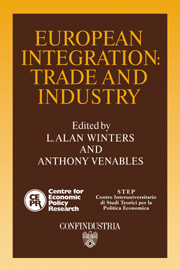Book contents
- Frontmatter
- Contents
- List of figures
- List of tables
- Preface
- Acknowledgements
- List of conference participants
- 1 European integration: trade and industry
- 2 Completing the internal market in the EC: factor demands and comparative advantage
- Discussion
- 3 External effects and Europe's integration
- Discussion
- 4 The quality and production of textiles and clothing and the completion of the internal market
- Discussion
- 5 Competition and imports in the European market
- Discussion
- 6 The structure and determinants of East–West trade: a preliminary analysis of the manufacturing sector
- Discussion
- 7 1992 and EFTA
- Discussion
- 8 Technology policy in the completed European market
- Discussion
- 9 Corporation tax, foreign direct investment and the single market
- Discussion
- 10 Japanese direct manufacturing investment in Europe
- Discussion
- Index
Discussion
Published online by Cambridge University Press: 07 September 2010
- Frontmatter
- Contents
- List of figures
- List of tables
- Preface
- Acknowledgements
- List of conference participants
- 1 European integration: trade and industry
- 2 Completing the internal market in the EC: factor demands and comparative advantage
- Discussion
- 3 External effects and Europe's integration
- Discussion
- 4 The quality and production of textiles and clothing and the completion of the internal market
- Discussion
- 5 Competition and imports in the European market
- Discussion
- 6 The structure and determinants of East–West trade: a preliminary analysis of the manufacturing sector
- Discussion
- 7 1992 and EFTA
- Discussion
- 8 Technology policy in the completed European market
- Discussion
- 9 Corporation tax, foreign direct investment and the single market
- Discussion
- 10 Japanese direct manufacturing investment in Europe
- Discussion
- Index
Summary
This study provides a well-balanced survey on the recent development of Japanese direct investment in Europe. It is specially useful in that the authors address many important questions concerning the motivation and strategy of Japanese direct investment in Europe, and its effects on European industries, and attempt to answer these questions with available evidence.
One of the interesting questions that the authors raised in the study, but to which they could not provide any clear-cut answer, is that of who benefits most from Japanese direct investment. Is it the member state that hosts Japanese investment, or the EC as a whole? This question is particularly important when one discusses the policy implications of Japanese direct investment: should we consider the Japanese investment problem from the perspective of each member state, or from the EC-wide perspective? Some examples will serve to illustrate this point. The UK government has been quite keen to invite Japanese automobile manufacturers to the depressed regions with the expectation that Japanese investment will revitalise the regional economy. While such policy is formulated from the perspective of the UK government, it has important economic consequences for the other member states when exports from the UK subsidiaries of Japanese automobile manufacturers reach their markets and compete with their products. On the other hand, Japanese investment in Spain may speed up the adjustment process that is necessary for the completion of a single EC market if it contributes to reducing the economic gap that exists between Spain and the other member states. In this case, regional policy towards Japanese investment may benefit the EC as well.
- Type
- Chapter
- Information
- European IntegrationTrade and Industry, pp. 231 - 233Publisher: Cambridge University PressPrint publication year: 1991



